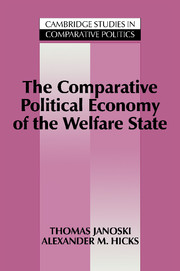Book contents
- Frontmatter
- Contents
- List of contributors
- List of tables and figures
- Preface
- 1 Methodological innovations in comparative political economy: an introduction
- PART I TIME-SERIES ANALYSIS
- PART II POOLED TIME-SERIES AND CROSS-SECTIONAL ANALYSIS
- PART III EVENT HISTORY ANALYSIS
- PART IV BOOLEAN ANALYSIS
- Author index
- Subject index
1 - Methodological innovations in comparative political economy: an introduction
Published online by Cambridge University Press: 05 June 2012
- Frontmatter
- Contents
- List of contributors
- List of tables and figures
- Preface
- 1 Methodological innovations in comparative political economy: an introduction
- PART I TIME-SERIES ANALYSIS
- PART II POOLED TIME-SERIES AND CROSS-SECTIONAL ANALYSIS
- PART III EVENT HISTORY ANALYSIS
- PART IV BOOLEAN ANALYSIS
- Author index
- Subject index
Summary
New methods in comparative/historical research have changed the face of analysis in macrosociology. Adam Przeworski has recently stated that
the number of recent methodological developments are profoundly affecting the practice of cross-national research and provide us with a repertoire of instruments approaching a standard operating procedure. Methodological habits and the knowledge of particular techniques are quite widely diffused among younger scholars. (1987, p. 42)
Yet he states that “all the methodological perspectives” found in the standard research volumes on comparative methods “had been articulated by 1970 and often long before” (p. 34). The problem is that the new methodological developments have not been incorporated into the pedagogic literature of readers and texts, much less integrated with some encompassing and coordinating framework. This volume fills this gap by concentrating on the broadly mathematical contingent of the new comparative/historical methods and doing so with a further focus on their application to the political economy of the nation and the welfare state.
The new methods stress sensitivity to time as well as place. Quantitative approaches to comparative research consist of cross-national, time-series, pooled time and cross-sectional, and event history techniques of analyses. Cross-sectional analysis has been done for over 20 years, and its methodological issues remain critical to valid analyses; however, we will not cover them in this volume. Time-series analysis has made its mark on single-nation studies in the past few years, but time-series analysis has only begun to be seriously used in comparative research, and it has many problems concerning comparability.
- Type
- Chapter
- Information
- Publisher: Cambridge University PressPrint publication year: 1994
- 2
- Cited by



